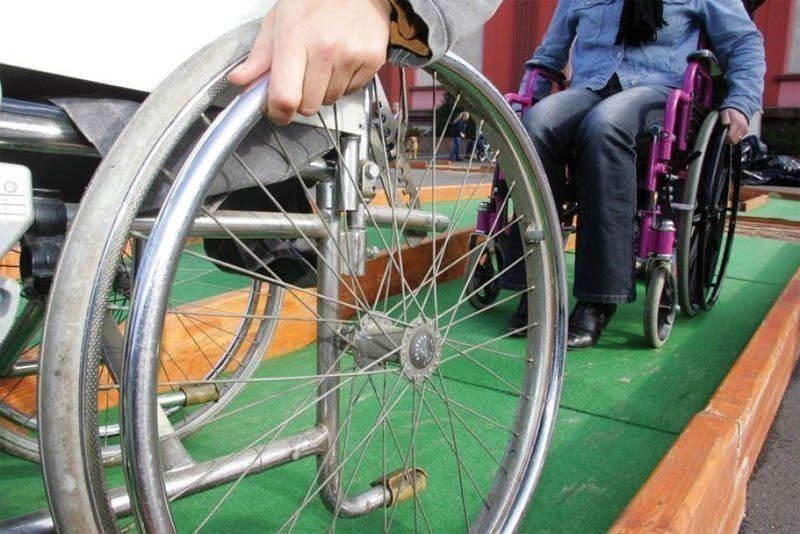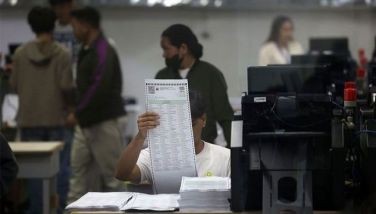Groups say House reps' slamming of PWD card abuse exposes holes in disability legislation. Here’s how

MANILA, Philippines — Anti-Crime and Terrorism Community Involvement and Support Partylist (ACT-CIS) party-list Rep. Eric Go Yap on Tuesday filed House Resolution 454 which sought a probe into the alleged issuance of persons with disability identification cards by local government units to unqualified and undisabled individuals.
The said PWD IDs were obtained from “fixers” for as much as P3,000 per card.
Yap pushed for RA 10754 to be amended and to include penal provisions punishing those who will abuse the law.
“I asked 15 persons to try faking their disability and get an ID two months ago, [and] they were able to use their IDs in establishments,” he said in Filipino at a press conference. “If we don’t act on this now, this would eventually become an outbreak, because this is being offered anywhere.”
Supporting a possible inquiry was Anakalusugan Party-List Rep. Mike Defensor, chairman of the Committee on Public Accounts. “I support it. May kaibigan rin ako na mayroong PWD ID kahit hindi naman dapat,” he said. “Iyung buwis natin dito bilyun-bilyon ang nawawala.”
In closing, however, Yap made it a point to encourage restaurant owners and employees to take pictures of suspected fakes. “If you are fired, approach us, and we will defend you,” he said.
Many PWD groups found this statement unfair, saying it baselessly puts the onus on legitimate persons-with-disability to prove their being disabled despite already being legally recognized as such by virtue of the very card being disputed.
Not just a discount
However, this statement says more about disability laws in the Philippines beyond just the processes involving the issuances of PWD cards.
Representatives of the Association of Empowered PWDs Philippines Inc. (AEPPI), in a phone call with Philstar.com, said that Yap’s statement reflected a pronounced lack of understanding of the wide spectrum of disabilities in society at large, as well as that of the daily struggles of the disability community.
The term “person with disability” covers a wide range of afflictions that can range from psychosocial and mental disabilities to verbal and hearing impairments. In adopting the United Nations’ 2030 agenda as one of the organization’s member states, the Philippines, too, committed to securing one of the agenda’s central tenets: to leave no one behind.
Under Republic Act 10754, PWDs are given a 20% discount and exemption to value-added tax to go with a 5% discount on basic necessities and prime commodities and free use of express lanes in commercial and government transactions.
Thus, holders of the IDs are legally entitled to discounts on food, medication, transportation privileges, among other things. They are largely afforded many of the same privileges extended to senior citizens.
But AEPPI Secretary and Head Officer Shiela Laudato told Philstar.com that the card itself was more important than the benefits that came with it. “Hindi kami nagpopokus doon sa discount,” she said.
“Ang mangyayari ay ikaw ay identified bilang isang PWD. Yung ID mo is your identity [as] being part of this sector. Malaking bagay yan para sa mga may kailangan talaga.”
Broken system
Racquel Nicdao of PWD advocacy page PWDe told Philstar.com that House leaders should bear in mind that this “rot” wasn’t an isolated incident within the PWD context alone, but one that was present “everywhere in the Philippine society.”
“It is not the fault of real and authentic PWDs that some LGU representatives or employees are [not] checking the validity of the requirements needed to claim for a PWD ID,” Nicdao said. “The poor PWDs who need help should not be blamed for inefficiency in the system.”
Laudato, whose San Pedro, Laguna-based organization consists of 14 barangay chapters and over 700 members, said that there were no such instances of PWD card fakes reported among their membership. Emer Rojas, President of PWD advocacy group New Vois Association of the Philippines was also careful to contest Yap’s claim, telling Philstar.com that, “we have not received any evidence that they are being sold.”
He, however, admitted that “it is not a remote possibility [because] this may be based on compassionate decision made by the Persons with Disability Office (PDAO) or MSWD staff to people in need.”
“[T]he law and its IRR is clear on the guidelines on the issuance of the PWD IDs,” Rojas said. “The weak point may be in the implementation as some LGUs may not be that strict in processing applications.”
For Nicdao, the crux of the matter is that “it is the system that doesn’t work.”
Systemic inefficiencies involving laws for the disabled are aplenty.
One main problem Laudato said their members experienced instead, particularly those with developmental ailments, was discrepancies between medical certificates and the PWD cards themselves.
“Isa sa [mga] problemang nakikita ko [ay] parang hindi akma ang disability type na nilalagay sa card. Kung ano ang cinertify ng doktor, iyon [dapat] ang susundan ng PWD office,” she said.
Lack of definition
In a statement sent to Philstar.com, the Organization for Pinoys with Disabilities Inc., also known as PWD Philippines, pointed out that many difficulties arise because the mechanisms for identifying disabilities and securing their corresponding certification are largely non-uniform.
“Sometimes, PDAOs have a different interpretation of what should be a disability and what is not. For instance, HIV is considered a disability in some cities, [while] in some cities, persons living with HIV are not considered as PWDs,” PWD Philippines said.
“[E]very city/municipality [also has a different] PWD ID layout, logos and set of benefits, aside from that which has been mandated by RA 10754.”
They added that sometimes the invisible nature of disability further opened the disabled to additional discrimination. “Be more discerning before immediately condemning an ID holder just because you do not see his disability,” they said. “[Lack of discernment] is an oversight of the issuing agency and should not be held against the ID holder.”
A study by the University of the Philippines Center for Local and Regional Governance (UP CLRG) noted that “standardizing the classification of disabilities” was a “global concern.”
The study recommended that lawmakers and medical professionals alike consider the International Classification of Functioning, Disability and Health (ICF) model of disability, a framework designed to facilitate the describing and organizing of information on disability that was approved for international usage by the World Health Assembly in 2001.
According to a Center for Disease Control and Prevention briefer on the ICF, the framework “can provide or underpin a descriptive profile of an individual's pattern of functioning, not a 'yes' or 'no' answer about whether he or she is disabled. A decision about where to draw a line between ‘no disability’ and ‘disability’ depends on the purposes for doing so.”
The ICF sought to identify “functioning” as a result of the many factors constituting one’s dynamic interaction with the environment rather than focus solely on the impairments of disability. WHO has since recommended the ICF as the foremost basis for standardization of information on human functioning and disability.
UP CLRG, in its study, drew a stark contrast between the ICF approach to diagnosis and description and “the use of an impairment approach to disability measurement” that was prevalent in LGUs in the country.
Disabled LGUs
According to a 2010 census, there were 1.44 million Filipinos in the country living with a disability, a number accounting for 1.57% of the total population that year.
Six years later, a 2016 study by UNICEF estimated that there were 3.3 million children with disabilities in the Philippines, more than doubling the number from six years before, with less than 3% of them having access to education.
The National Disability Prevalence Survey of the Philippine Statistics Authority also revealed that in 2016, some 12% of Filipinos aged 15 and older experienced severe disability, while almost half experienced moderate disability and 23% had mild disability.
UP CLRG, in its study, found that only six out of ten local government units in the Philippines established a dedicated PDAO, marking 33 provinces, 25 cities and 282 municipalities lacking PDAOs for their disabled constituents. This, despite the mandate of RA 10070, which requires that LGUs designate PWD Affairs Offices.
“Mga disability laws namin, magaganda. Ang kulang is the execution at implementation. Hindi talaga ini-implement ng local executives natin,” AEPPI President Daniel Evangelista, a PWD himself, said. “Ang DILG, ayun, tinutulungan nila kami, pero hindi nila kaya as one agency lang. Very lax ang aming mga LGU. Walang ngipin ang mga laws natin para sa mga disabled.”
Many PWD groups have expressed willingness to collaborate with their respective LGUs on the issue, with the consensus that faking a disability for the stipulated benefits should be criminalized on both sides.
Moving forward
Of the proposed probe, Rojas said that “evidence must be shown first to prove that the PWD IDs are indeed being sold. If such indeed exist, sanctions according to law on corruption must be imposed [on] erring LGU employees or maybe sent to appropriate training, the least.”
“Hanapin ang source nun. Anybody caught na peke ang kanilang PWD ID, dapat mapanagutin sa batas natin. 'Pag nahulihan ka, you must answer to the law,” Evangelista sounded off for his part.
“Pagnanakaw yun, harap-harapan.”
PWD Philippines pointed out that the Department of Health used to have a now-defunct national database for persons with disabilities. The group proposed that this could be used for verification purposes, stating that a mobile application could even be developed for this purpose. They said they were ready to extend any support they could for such an endeavor.
Because of the lack of PDAOs in many barangays, Evangelista said, “There must be one agency na pwedeng pagreklamuhan. Eh wala tayo eh, politics talaga, yun ang umiiral.”
“Madaling mapeke kung yung mga nag-iisyu, yun ang business nila. Kung talagang ang nag-iissue ay hindi authorized,” he added.
PWD Philippines also called for the public to extend sensitivity to their disabled counterparts and for companies to be more informed of the benefits they receive when they employ disabled people. “Remember: lupus, epilepsy, bi-polar, extreme anxiety and depression, autism spectrum disorder, ADHD, organ replacement, cancer survivors, or even missing toes, are non-apparent disabilities that need not be humiliated or subject to embarrassing questions.”
Of the many discrepancies in diagnosing disabilities, UP CLRG urged that “a common definition” be used “to lessen the variance in reporting between LGUs, [though] it need not necessarily be the ICF.”
More than just ‘PWD na’
“Number one for us [is still] accessibility,” Evangelista said of existing PWDs who already have cards. He pointed to the accessibility of malls, government buildings and public utilities as one area that largely goes unimplemented.
"The great majority of public buildings remained inaccessible to persons with physical disabilities,” the US State Department affirmed in its Country Reports on Human Rights Practices for 2018.
“Many schools had architectural barriers that made attendance difficult for persons with disabilities. Government efforts to improve access to transportation for persons with disabilities were limited.”
The 80-year-old Evangelista shared that this was a struggle for people like him, as he had been a PWD “since the very beginning” after contracting polio at the young age of six.
Despite his ailment, Evangelista shared that he was able to graduate with a college degree. As things were starting to look up when he was 51 years of age, the 1990 Luzon earthquake struck. The PWD advocate recalled how he wound up trapped under rubble and lost both his legs. “I’m a below-knee amputee,” he explained.
“[Ang mga malusog] lang ang nakaka-enjoy ng free access sa mga pwede nating magawa. Kaming mga disabled, hindi natin magagawa, kasi walang implementation [ang gobyerno.]”
Even with the weight of his physical disability and the systemic struggles that come with it, Evangelista proudly declared, “I am a PWD and I am a Filipino. My disability is not a liability.”
“I have the right to enjoy all the rights enjoyed by ‘normal’ [people].”
- Latest
- Trending






























